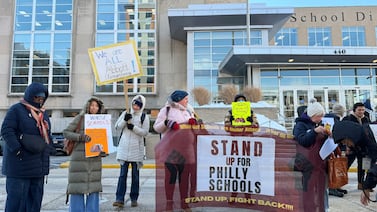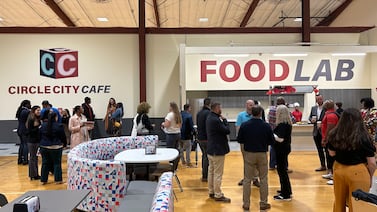Sign up for our free monthly newsletter Beyond High School to get the latest news about higher education in Colorado.
Can a college degree improve a person’s civic participation?
Absolutely — but the unequal ability of students to graduate from college undermines their chances at participating in U.S. democracy, according to Complete College America.
The national nonprofit advocates for dramatically increasing college completion rates and improving student success. The new paper it released last month offers a view of the links between a healthy democracy and higher education.
The paper also calls for colleges to play a greater role in helping Americans achieve the economic success that allows them to better participate in democracy.
A college degree affords students economic stability through access to higher paying jobs, said Charles Ansell, vice president for research, policy, and advocacy at the nonprofit. That in turn leads to more time for leisure and civic engagement, he said, such as voting, volunteering, or even running for office.
“You need to meet a minimum threshold for a good life,” Ansell said. “Then you don’t have to be in this rat race all the time.”
The paper, published just after the November election, outlines several points as to why higher education has a larger role to play in helping Americans participate civically. The report calls for a greater focus on college completion rates, schools to place more focus on civics, and higher education to better respond to the real-world experiences students face.
Ansell said the subject is also critically important for a divided electorate to help create more political understanding.
Ansell said part of the problem is economic disenfranchisement. Graduates earn 44% more in wages annually than those with a high school diploma. Yet the U.S. has a big divide in who gets to college and graduates. Many students of color and from low-income backgrounds don’t graduate on time — or graduate at all.
The reality is that those who have the privilege graduate at higher rates, get the good jobs, and have the most time to participate in civic life, Ansell said.
And college students who drop out more often feel like the economy doesn’t work for them, especially as they pay back the cost of going and earn less money overall, he said. Too many Americans are struggling to survive, living from paycheck to paycheck, he added.
Only 54% of all Americans have a higher education credential or higher. Yet more and more jobs require college education.
For instance, Colorado is the most educated state in the country as measured by college degree attainment. While the same problems still exist here in graduation rates and who gets a degree, Ansell said many feel the economy is working for them.
Ansell said Colorado has focused more on career and college readiness through high school dual enrollment. And he said Gov. Jared Polis and lawmakers have focused a lot on the economic welfare of Coloradans.
In recent years, Colorado has focused more on the return on investment of students, including creating a statewide plan that focuses on ensuring students reap the benefits of college after they graduate.
“And it seems like higher education institutions I work with in Colorado are quite responsive to making sure that students are getting that return on investment,” he said, specifically mentioning Metropolitan State University of Denver for its work with students from lower-income backgrounds and students of color.
But Colorado’s push for more high schools to teach college-level classes and certificates could include more civics classes, he said. And that’s true nationally, he added.
Colleges and universities also have low public approval ratings despite Republican and Democratic lawmakers viewing them as important economic engines for their states. Schools need to do more to help students, including combating high tuition rates and showing their value through graduating students so they can get better jobs, the report says.
“If graduation rates are as low as they are, that’s going to have a severe impact on our democratic health,” said Ansell .“And for many people, college is an interaction of failure, and it’s an interaction of systems failing them.”
Jason Gonzales is a reporter covering higher education and the Colorado legislature. Chalkbeat Colorado partners with Open Campus on higher education coverage. Contact Jason at jgonzales@chalkbeat.org.







